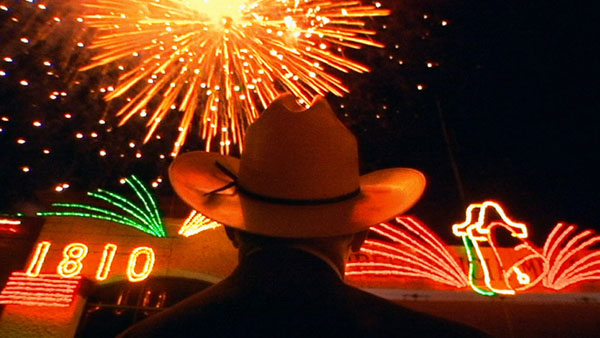“Brothers Bill and Turner Ross return to the quick-paced, collage style documentary storytelling we’ve seen previously in Tchoupitoulas and 45365” with Western, “a tale of two cities,” writes Monica Castillo at Movie Mezzanine. “One, Eagle Pass, lies north of the Rio Grande, a small Texan town with a big Latino population that specializes in the cattle industry. Her sister city south of the border, Piedras Negras, is similarly reliant on the cow trade—and just as sweet and sleepy when the movie begins. The two cities celebrate their mutual bond annually on the bridge that connects them. That is until the recent spike in Mexican cartel violence shows up on their doorstep.”
“It’s hard now, when it’s become such a mindlessly polarized talking point—let’s build a fence on the border, etc.—to recall a time when mainstream American conservative politics wasn’t intensely fixated on illegal immigration and cartel violence,” writes Vadim Rizov at Filmmaker, “but the Ross Bros.’ film captures the moment cartel awareness was really penetrating these shores.” And “as a native Texan it’s my experience that the lunatic minutemen patrolling the border with itchy trigger fingers don’t represent the pragmatic majority of a state that understands exactly where its labor force is coming from. For me, one of the nice things about Western is its highlighting of a functional, non-xenophobic liminal zone, as far removed from the posturing of its lunatic governor as from the dusty border noir terrain of Rolling Thunder and No Country for Old Men.”
“Western is cinematic nonfiction of a superior order,” declares Michael Tully at Hammer to Nail. “Shot over the period of 13 months and edited for a year-and-a-half, Western moves at a brisk, yet natural and fully lived in, pace. It isn’t until the first 30 minutes have passed that a hint of danger begins to creep in. There are brilliant flashes of foreboding throughout, yet they’re so subtle at first that you might wonder if you’re reading into things: grackles hovering on barbed wire fences; a torrential rain storm during a public gathering. But as the danger in Mexico arrives in Piedras Negras and edges ever closer to Eagle Pass, Western morphs into an outright thriller.”
Variety‘s Scott Foundas notes that “the Rosses turn on a dime from the matter-of-fact (meetings with councilmen and constituents, the daily grind of ranch work) to the lightly impressionistic (desert winds blowing down dusty, empty streets) and back again. Stylistically, they seem to be informed equally by the cinema verite world of the Maysles brothers, the loving ethnography of Les Blank, and the ecstatic landscapes of Terrence Malick—a mix of influences that makes Western fascinating to watch even when it (occasionally) seems too enamored of its own poetic longueurs. Always, the film benefits from the brothers’ instinctive observational gifts and their intimate access to both communities, which seem far more alike than different, no matter the $49 billion border fence that threatens to divide them.”
More from Sam Fragoso (RogerEbert.com), Sheri Linden (Hollywood Reporter), Stephen Saito and Katie Walsh (Playlist, A-). And Filmmaker‘s Scott Macaulay has five questions for the Ross brothers.
Updates, 1/31: “Western does what a good documentary should,” writes Wesley Morris at Grantland. “It engages your sense of wonder, closes the gap between the foreign and the familiar. The film leaves the politics and violence as a backdrop. The situation comes through in snippets of Spanish-language news reports, call-in radio, conversations glimpsed from the street through diner windows, and shots of [Eagle Pass mayor Chad] Foster, who died of cancer in 2012, reading, from hate mail, accounts of his treasonous ways. But the Rosses’ uninflected focus on daily life permits you to consider the ongoing upside of these so-called border wars. Eagle Pass is a town full of bilingual white Texans and Mexicans. The fence is meant to keep out illegal trespassers and make Americans feel safe. But the cultures feel irrevocably merged. There’s nothing a fence can do about that.”
Indiewire hands its Sundance questions to the Rosses.
Updates, 3/21: Steve Macfarlane at the L: “Western is not a piece of investigative journalism; what’s intrepid is the Rosses’ unapologetic sense of American saudade, forever braking to indulge a sun-drunk Lone Star state of mind.”
“After the film’s early optimism and speculative midsection, Western struggles to manage all the rich dramatic irony of its final half hour, perched uneasily between plot and stasis,” writes Christopher Gray for Slant. “Once the narrative of the drug war fully insinuates itself into the rhythms of life in Eagle Pass and Piedras Negras, the filmmakers seem unsure of how to reclaim their own story, but for most of Western, they exhibit a remarkable faculty for integrating the news into their portrait of two towns and two men on the edge.”
Steve Dollar talks with the Rosses for the Wall Street Journal.
The Sundance 2015 Index. For news and tips throughout the day every day, follow @KeyframeDaily. Get Keyframe Daily in your inbox by signing in at fandor.com/daily.




